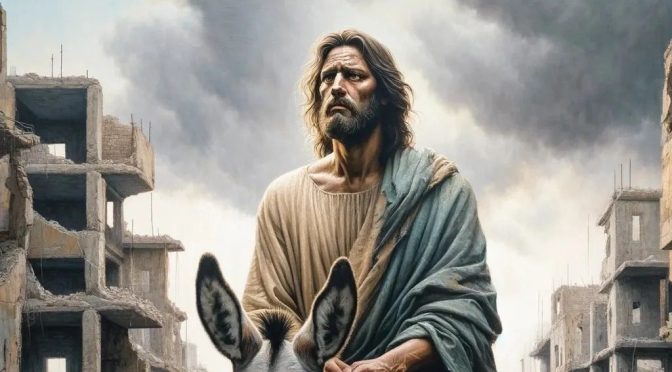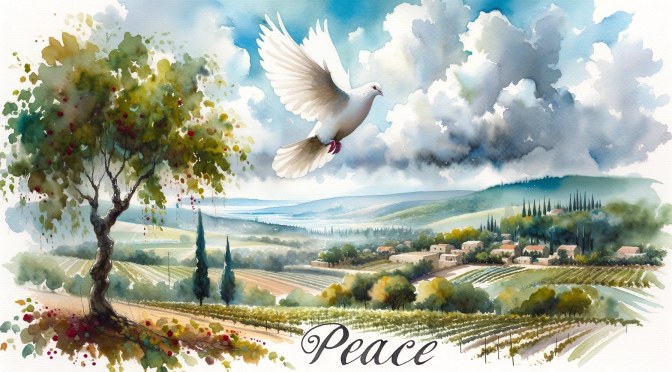by Sune Fahlgren.
This advent, Matthew 21 will be read in churches all over the globe, telling the story of when Jesus rides into Jerusalem on a donkey. Let us imagine Jesus instead approaching Gaza City… The Prince of Peace has heard the cries from over two million people, completely without future and hope. What happens when he rides into war-torn Gaza?
A gigantic humanitarian disaster is already a fact. Jesus knows this and therefore chooses to see reality with his own eyes during a few days of temporary ceasefire.

The disciples have rushed ahead to arrange permission through the now only possible border crossing at Rafah, a place that Jesus passed with his parents during their flight to Egypt. The disciples present Jesus as the supreme leader of the approximately 300 Christians remaining. They want to celebrate the advent of hope with Jesus’s radical message of peace at the center.
The stir is great at Rafah during the temporary ceasefire, with both prisoner exchanges and queues of long-haul trucks with aid. Like everyone else – diplomats, healthcare, and aid workers, truck drivers – Jesus must go through security procedures. Even his sandals are x-rayed. However, he is completely unarmed. Jesus and three of his disciples are allowed in.
Inside the Gaza Strip, which is no larger than Las Vegas, some young boys offer Jesus a donkey to ride on. Cars exist, but gasoline is now lacking. Lamps exist, but there is no longer electricity. Water exists in springs, but it is not drinkable.
Jesus’s path goes through a moonscape. Old monasteries and Christian memorials from desert fathers and mothers are now just grains of sand. Israeli military operations in 2008, 2012, 2014, and now 2023 have dropped tens of thousands of bombs, causing devastation of unimaginable proportions. Every teenager in Gaza has been traumatized multiple times.
The closer Jesus gets to Gaza City, the stronger the sewage stench from the Mediterranean. There are no longer any functioning purification plants. All sewage is flushed into the sea. Even the once beautiful beaches with fishing boats are now a ticking bomb.

Jesus rides slowly into Gaza City, which has become a “ghost town”. He recites aloud the old prophetic words: “Prepare the way for the Lord in the wilderness, make a straight path in the desert for our God…” Then Jesus begins to pronounce names of places where violence has triumphed in modern times: Guernica, Oradour, Babij Jar, Katyń, Lidice, Sharpeville, Treblinka, Hanoi, Rwanda… “And in advent 2023, we must add Gaza,” says Jesus with sorrow in his voice.
The remaining people in Gaza City have heard about the unusual visit and come running. In the absence of anything else, they lay their t-shirts on the ground. Some have made palm leaves out of bomb scrap. Some young men dance dabke in front of the donkey ride, and children sing along the way “Biladi, ya ardi” (“My homeland, my earth”). Jesus is hailed as a prophet, a liberator.
The disciples start to get worried. Surely Jesus shouldn’t be this political? He could be killed as a supporter of Hamas. Silence the children! They are singing the national anthem. But Jesus calms the anxious:
“Strangely enough, there is currently a unique space for action for all involved parties. I want to talk to the leaders of Israel and the Palestinians about their responsibility, and offer a vision of Gaza as a thriving free trade area in the Mediterranean – like Singapore in Asia. I want to meet with Netanyahu, and as a Jew, plead for the peace talks to be resumed for the sake of Israel’s own best.”
Jesus reminds that he has already delivered a speech to humanity known as the “Sermon on the Mount”. A message of bold kindness and radical mercy. It is now the mission of his disciples to turn this manifesto into socio-politics and broad popular movements. Violence must not obliterate politics! The Jewish philosopher Hannah Arendt argued that “only through politics does real power and freedom develop.”

We, who in thought accompany Jesus into Gaza, probably find it hard to see a solution to the war that is now raging. But still, it is not only the violence and nationalism of the warring parties that prevent a just peace, but the self-absorption of many at political or at “biblical” and other religious positions. My question is therefore: Where are the broad alliances, built on respect for each other, where we dare to seek out the core of the conflict?
Gaza is a microcosm of evil and barbarity in our time, but also of simple people’s distress, courage, and resilience. To imagine Jesus riding into Gaza highlights the horrors of war: the arrogance of power, the ongoing displacement, and the vulnerable situation of civilians.
Sune Fahlgren is associate professor of practical theology at the University College Stockholm, Sweden. This is a modified translation of an article he wrote for the Swedish newspaper Dagen.









